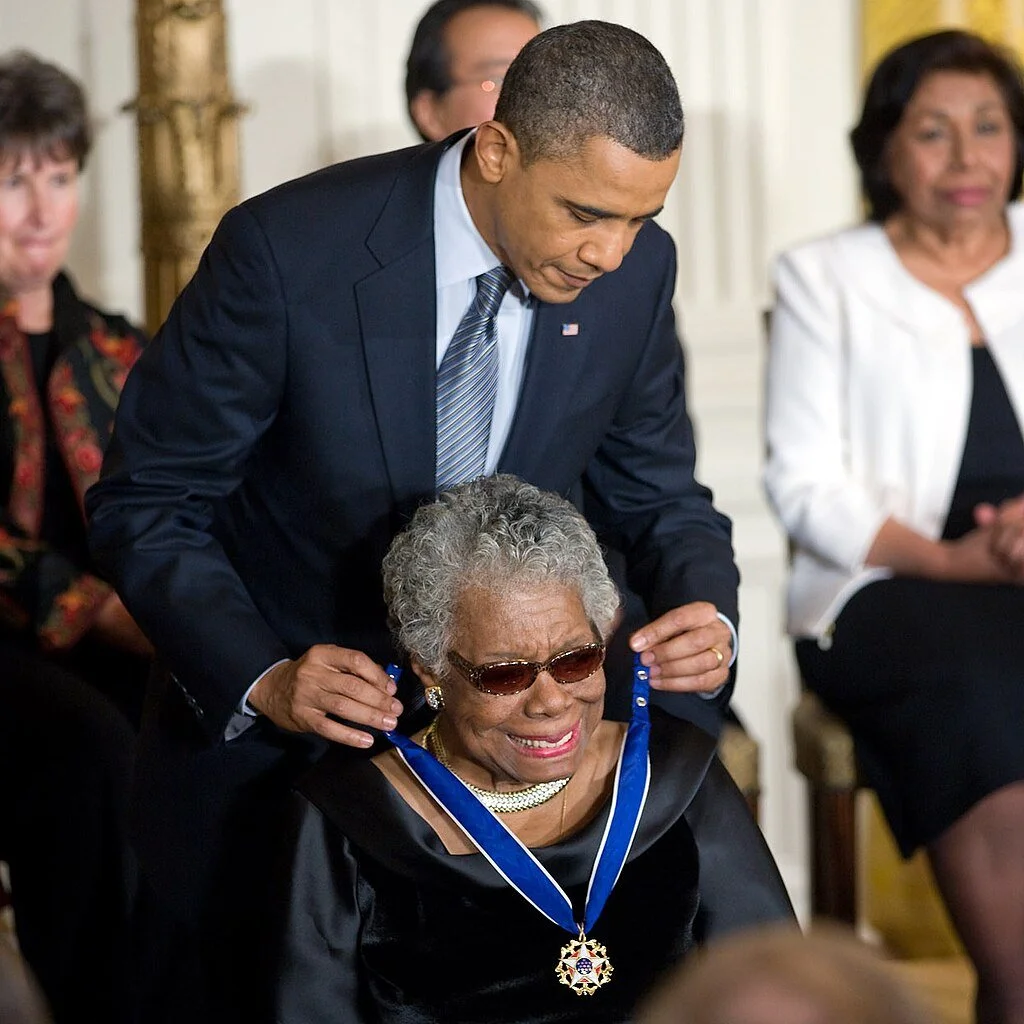Maya Angelou and the Art of Rising Above Silence
/Stephen Parker / Alamy Stock Photo
Before she became one of the most celebrated voices in literature and social justice, Maya Angelou was a young girl who refused to speak. Born Marguerite Annie Johnson in 1928, she endured trauma, silence, and loss—but found healing in words. Through her writing, Angelou transformed personal pain into universal truth, reminding the world of its shared humanity.
A poet, memoirist, and activist, she used her voice to bridge divides and uplift generations. Her words in Caged Bird echo that spirit: “The caged bird sings of freedom,” a reminder of her enduring commitment to resilience and liberation.
Early Life
Maya Angelou’s early life was shaped by both trauma and transformation. After her parents’ divorce, she and her brother were sent to live with their grandmother in Arkansas. When she later returned to her mother’s care, she was sexually assaulted by her mother’s boyfriend, whose subsequent murder left her believing she was to blame.
Silenced by guilt, Angelou stopped speaking for nearly five years, turning instead to books for comfort and understanding. During this time, she developed a love for literature and a deep ability to observe the world around her. With the help of her teacher, Mrs. Bertha Flowers, she eventually rediscovered her voice—a turning point that set the foundation for her lifelong connection to language and storytelling.
Literary Contributions
U.S. president Barack Obama presenting Angelou with the Presidential Medal of freedom, 2011
Maya Angelou was a prolific storyteller, well known for her raw autobiographies and her rhythmic and genuine writing style. During her life she wrote seven autobiographies, three books of essays, several books of poetry, as well as a list of plays, movies, and television shows. She has received dozens of awards – including the Presidential Medal of Freedom – and more than 50 honorary degrees.
The first and most well-known of her autobiographies, I Know Why the Caged Bird Sings, tells the story of her youth and brought her international recognition and acclaim. The book is an excellent example of the themes of trauma and resilience that are present in many of her works. It is a profound narrative of finding voice and identity despite oppression and traumatic experiences.
Her poem Still I Rise is another shining example of hoe her struggles shaped her writing. It serves as a poetic anthem of defiance, dignity and survival. In the poem, Angelou addresses historical trauma, personal pain, and societal oppression with unwavering confidence: “You may trod me in the very dirt / But still, like dust, I’ll rise.”
Influence on Contemporary Literature
Angelou’s writing provided visibility for the struggles of black women and encouraged writers to exlore themes of identity, race and gender with honesty and pride. The style of her writing is widely considered to be raw, rhythmic, an genuine – as seen in Still I Rise – and her ability to combine confessional poetry with political and social commentary has influenced writers like Claudia Rankine, Warsen Shire, and Amanda Gorman. She has also mentored and inspired countless writers, including Oprah Winfrey and Elizabeth Alexander.
Timothy Hiatt 2011 (Left to right: Maya angelou and Oprah Winfrey on the Oprah Winfrey Show)
Activism and Social Justice
Maya Angelou was not only a literary icon but a force for social change whose activism helped shape the course of American history. During the Civil Rights Movement, she worked closely with both Martin Luther King Jr. and Malcolm X, lending her voice and organizational skills to the fight for racial equality. As the Northern Coordinator for King’s Southern Christian Leadership Conference, she helped advance his message of nonviolent resistance and unity.
Their friendship ran deep, and King’s assassination—on Angelou’s birthday in 1968—left a lasting wound. Earlier, she had collaborated with Malcolm X on the Organization of Afro-American Unity, which sought to connect African Americans with African liberation movements. His assassination in 1965 ended that work too soon, but not her commitment.
Angelou’s activism extended beyond borders. Through dance, theater, and poetry, she promoted cross-cultural understanding, performing across Europe, Africa, and the Middle East. Her words in Still I Rise and Caged Bird became global symbols of dignity and defiance, echoing through classrooms and protests alike.
The Power of Her Words
Today, Angelou’s message remains as urgent as ever. Her belief that “finding one’s voice is the path to liberation” continues to inspire movements like Black Lives Matter and #MeToo. She taught that language is not just expression—it is power, healing, and resistance. As she wrote in On the Pulse of Morning, “History, despite its wrenching pain, cannot be unlived, but if faced with courage, need not be lived again.” Her words challenge us still: to speak, to rise, and to act.
Sam at a concert in Downtown Ottawa
Sam Walt is a writer who loves turning complex ideas into engaging stories. Drawn to science fiction, dystopian worlds and genres that challenge imagination and society, Sam studies Professional Writing at Algonquin College. With a growing focus on the work of female authors, Sam combines technical skill with literary insight. When not writing or editing, you’ll find Sam thrifting for treasures, catching live music or tending to a small jungle of houseplants—always chasing good stories and good tunes.





